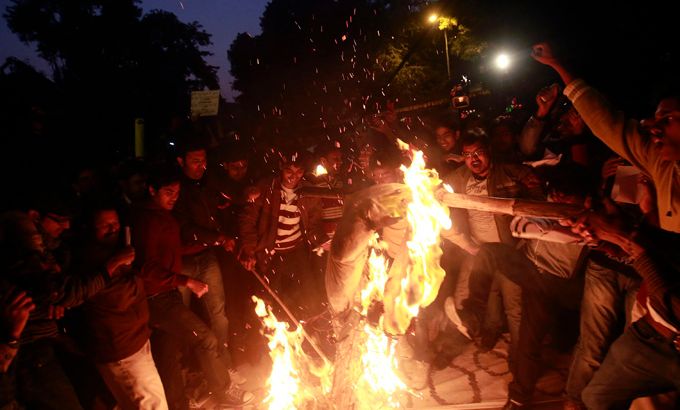Protests and vigils for India rape victim
Thousands gather to demand justice for 23-year-old who died from injuries sustained in attack and other rape victims.

Protesters in India calling for harsher punishments for rapists have been holding a candle-lit vigil in the capital.
They gathered in New Delhi to mourn the death of a 23-year-old gang rape victim who died after being gang-raped and beaten on a bus was cremated.
After her death, thousands of mourning Indians lit candles, held prayer meetings and marched through various cities and towns, including New Delhi, Mumbai, Bangalore and Kolkata, on Saturday night to express their grief and demand punishment for the crime.
The victim, who has not been named, died on Saturday, soon after being sent to Singapore for medical treatment to treat her grave internal injuries.
Scuffles broke out in central Delhi between police and protesters who say the government is doing too little to protect
women.
But the 2,000-strong rally was confined to a single area, unlike last week when protests raged up throughout the capital.
Riot police manned barricades along streets leading to India Gate war memorial – a focal point for demonstrators – and, at another gathering point – the centuries-old Jantar Mantar – protesters held banners reading “We want justice!” and “Capital punishment”.
Hours after the victim died on Saturday, Indian police charged six men who had been arrested in connection with the attack with murder, adding to accusations that they beat and gang-raped the woman on a New Delhi bus on December 16.
Anger and grief
Protesters demanded stronger protection for women and the death penalty for rape, which is now punishable by a maximum of life imprisonment.
Women face daily harassment across India, ranging from catcalls on the streets, groping and touching in public transport to rape.
New Delhi police spokesman Rajan Bhagat said the six suspects face the death penalty if convicted, in a case that has triggered protests across India and raised questions about lax attitudes by police toward sexual crimes.
The tragedy has forced India to confront the reality that sexually assaulted women are often blamed for the crime, forcing them to keep quiet and discouraging them from reporting it to authorities for fear of exposing their families to ridicule.
Police often refuse to accept complaints from those who are courageous enough to report the rapes, and the rare prosecutions that reach courts drag on for years.
Al Jazeera’s Divya Gopalan, reporting from New Delhi, said many people were gathering on Sunday “in solidarity and to express their sorrow and disappointment at the way women are being treated across the country”.
“In Delhi alone there have been 600 rape cases this year from January, and only one conviction. So that gives you an idea of how the whole system is not geared to deal with this problem,” our correspondent said.
“The government has been appeasing people, saying; yes we’re setting up a panel; we’re looking at new laws and regulations, but at the heart of the issue is the whole mindset that is wrong.”
The woman and a male friend, who also has not been identified, were on a bus in New Delhi after watching a film on the evening of December 16 when they were attacked by six men who raped her.
The men beat the couple and inserted an iron rod into the woman’s body, resulting in severe organ damage. Both were then stripped and thrown off the bus, according to police.
The couple was planning to get married next year, neighbours of the boyfriend told local media on Sunday.
Gandhi, the governing party chief, assured the protesters in a statement that the rape victim’s death “deepens our determination to battle the pervasive, the shameful social attitudes and mindset that allow men to rape and molest women and girls with such an impunity”.
